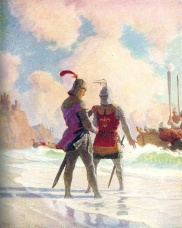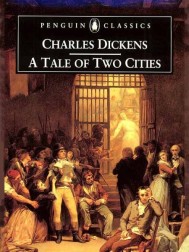Dear Readers,
Just a little over six weeks from now, June 12-14, the Great Homeschool Conventionreturns to California for three days of wonderful workshops, keynote speakers, and tantalizing curriculum exhibits! At Beautiful Feet Books, we look forward to connecting with you either at one of the three sessions I’ll be presenting, or at our BFB booth.
 One of the topics I will be speaking on is: Classic Literature for Character Building (or Character Through Literature), so I wanted to take a moment to give a brief overview of what my session will cover as you make plans for your GHC weekend!
One of the topics I will be speaking on is: Classic Literature for Character Building (or Character Through Literature), so I wanted to take a moment to give a brief overview of what my session will cover as you make plans for your GHC weekend!We can strip the knight of his amor, to reveal that he looks exactly like us, or we can try on the armor ourselves to experience how it feels. Fiction provides an ideal opportunity to try on the armor. –C.S. Lewis
Over thirty years of reading aloud to my children has convinced me, more than ever, of the profound life-changing, life-equipping, and soul-nourishing importance of great books. Recently I began reading Charles Dickens’s A Tale of Two Cities to my youngest daughter, aged 14. She was fairly ambivalent as we began, particularly because the 19th century English verbiage is challenging, to say the least. Not being familiar with Dickens can stop even an avid reader from wanting to continue what can be a truly challenging endeavor. Fortunately for me, an older adult son happened to be visiting at the time and remarked that A Tale of Two  Cities was his favorite book in high school. He even remembered writing his own Tale of Two Cities based upon Dickens’s great work. Haply, that helped cinch the deal, and we continue pursuing this remarkable novel knowing that the unforgettable characters that Dickens created in this work–the cruel Madame Defarge, the noble Charles Darnay, and the ultimately self-sacrificing Sydney Carton, will impact our hearts long after we close the final pages of this book. As Lewis notes in the quote above, we can either choose to live cynical unimaginative lives, or we can, through our imaginative powers walk vicariously in the shoes of another, and through that identification, ultimately determine what kind of people we want to be. Will we make noble, self-sacrificing choices like Darnay and Carton, or will we be unforgiving and vengeful as the cruel Madame Defarge? In small ways, we have an opportunity to make these choices each day.
Cities was his favorite book in high school. He even remembered writing his own Tale of Two Cities based upon Dickens’s great work. Haply, that helped cinch the deal, and we continue pursuing this remarkable novel knowing that the unforgettable characters that Dickens created in this work–the cruel Madame Defarge, the noble Charles Darnay, and the ultimately self-sacrificing Sydney Carton, will impact our hearts long after we close the final pages of this book. As Lewis notes in the quote above, we can either choose to live cynical unimaginative lives, or we can, through our imaginative powers walk vicariously in the shoes of another, and through that identification, ultimately determine what kind of people we want to be. Will we make noble, self-sacrificing choices like Darnay and Carton, or will we be unforgiving and vengeful as the cruel Madame Defarge? In small ways, we have an opportunity to make these choices each day.
 Cities was his favorite book in high school. He even remembered writing his own Tale of Two Cities based upon Dickens’s great work. Haply, that helped cinch the deal, and we continue pursuing this remarkable novel knowing that the unforgettable characters that Dickens created in this work–the cruel Madame Defarge, the noble Charles Darnay, and the ultimately self-sacrificing Sydney Carton, will impact our hearts long after we close the final pages of this book. As Lewis notes in the quote above, we can either choose to live cynical unimaginative lives, or we can, through our imaginative powers walk vicariously in the shoes of another, and through that identification, ultimately determine what kind of people we want to be. Will we make noble, self-sacrificing choices like Darnay and Carton, or will we be unforgiving and vengeful as the cruel Madame Defarge? In small ways, we have an opportunity to make these choices each day.
Cities was his favorite book in high school. He even remembered writing his own Tale of Two Cities based upon Dickens’s great work. Haply, that helped cinch the deal, and we continue pursuing this remarkable novel knowing that the unforgettable characters that Dickens created in this work–the cruel Madame Defarge, the noble Charles Darnay, and the ultimately self-sacrificing Sydney Carton, will impact our hearts long after we close the final pages of this book. As Lewis notes in the quote above, we can either choose to live cynical unimaginative lives, or we can, through our imaginative powers walk vicariously in the shoes of another, and through that identification, ultimately determine what kind of people we want to be. Will we make noble, self-sacrificing choices like Darnay and Carton, or will we be unforgiving and vengeful as the cruel Madame Defarge? In small ways, we have an opportunity to make these choices each day.
The best books inspire us, not by preaching lofty sermons, or by moralizing lectures, but by drawing us into stories that resonate with the human desire to love and be loved, and by our longing to live for something bigger and better than ourselves. In the novel Don Quixote, Cervantes states through his main protagonist that the ” . . . ultimate end of writing is both to instruct and delight” (476).1 Since Cervantes is credited with the invention of the modern novel, perhaps his perspective is one we should take to heart. Regarding the notion of “instruction” of course, as parents we get that, that is a given. In our parental role we are forever looking for resources to educate, inform, and instruct our children. But how often in that pursuit, do we neglect the notion of delight? When we make choices of literature, do we adequately factor in the importance of delight as an essential medium of the most important kind of learning? Consider how often Jesus used stories to teach moral lessons. His stories were never dry, dull, or boring. Rather they captured his listeners by their pure simplicity, their inherent truth and their clear applicability to everyone’s lives. All great literature has these same inherent qualities, from the simplest children’s book like Make Way for Ducklings to sophisticated novels like Pride and Prejudice.
In June I’ll be presenting the essential elements that make books delightful, and how stories have the power to truly mold ourselves and our children into the kind of characters we want to be in this great drama called life–written and directed by the master storyteller Himself. I hope to see you in June at the Great Homeschool Convention!
-Rea

I live in South America. I live in an area where children's literature isn't available. I teach in Sunday school. I have implemented a Charlotte Mason style approach in Sunday school. I have seen up close what it means to be starved of good an noble ideas. These kids are famished mentally. They lack the ability to imagine or be creative. There is no sparkle in their eyes. Life is very dull and flat. Since starting with Aesop's fables and applying narration to bible lessons I have seen a sparkle in their eyes. They are becoming engaged in learning and pondering ideas. It's just delightful.
ReplyDelete